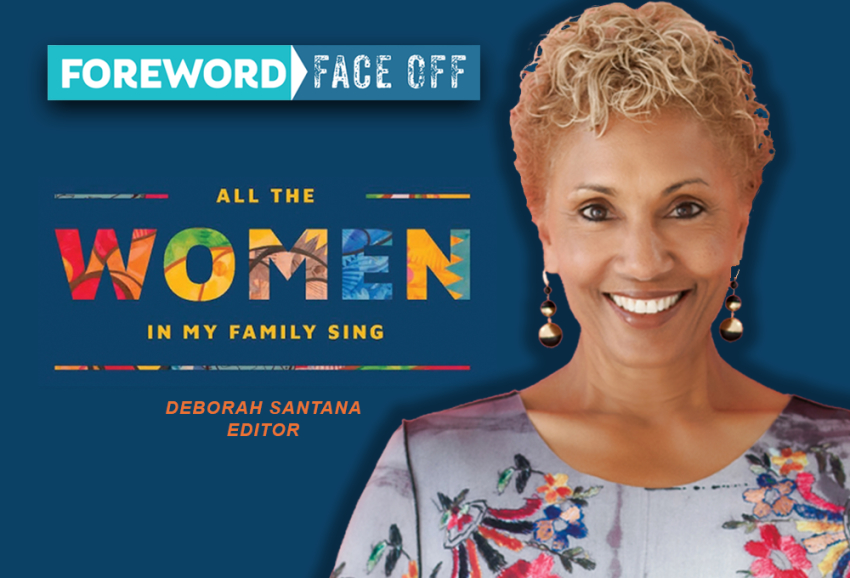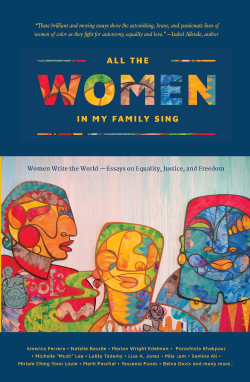Reviewer Meg Nola Interviews Deborah Santana, Editor of All the Women in My Family Sing

Do unto others … Let he who is without sin cast … Actions speak louder … For those to whom much is given … Give and ye shall … That which does not kill you … This too shall … To err is human, to forgive … The truth shall set you … Where there is a will …
Did you surprise yourself by easily filling in the remainder of each sentence? We should all be comforted to have such extraordinary wisdom at the top of our minds.
By way of introduction to this week’s Foreword Face Off, here’s another powerful axiom to set your moral compass by: Before you judge a woman, walk a mile in her shoes.
Meet Deborah Santana, coeditor and progenitor of All the Women in My Family Sing, a collection of essays from nearly seventy women of color—each offering a glimpse “into the hard-fought struggle to exercise one’s autonomy, creativity, and dignity while rejecting the notion of second-class status or citizenship,” according to the intro.
As we individually seek to better understand the immigrant experience, civil rights, LGBTQ issues, and the endless quest for universal equality, projects like this one enable us to strap on the proverbial walking boots of strangers in our own land. Too often in the publishing world, the female experience is marginalized just as it is in all other segments of society. We implore you to walk a mile for empathy and tolerance.

Foreword reviewer Meg Nola reviewed All the Women in My Family Sing in the Jan/Feb issue of Foreword Reviews, in addition to conducting the following interview. You’ll find the week’s Special Features and Featured Reviews at the end.
With its sixty-nine essays, All the Women in My Family Sing clearly has a wide range of voices and realm of experience. In your foreword, you make a wonderful observation about how being involved with this anthology “added beauty, abundance, humility, and grace” to your life. You also note that you worked on the project for about three years. How did you know when it truly felt complete?
It felt complete when all of the essayists signed off on their work, even though there was further editing, proofing, and endorsements to come. This collection could absolutely be one of a series. I would love to bring the voices of scientists, athletes, politicians, spiritual seekers, yogis, philosophers, and healers to future anthologies.
What was the process of gathering the essays? Did you seek out any writers in particular, or was it more of a serendipitous or flow-like process, with one leading to the next?
We advertised in Publisher’s Weekly and sent out calls for submissions through Facebook, Voices of Our Nation (VONA), and other writers’ resources. In addition, women found out about the anthology from friends and emailed me asking if they could submit. Some writers were solicited for inclusion and graciously accepted. In the initial gathering of essays, two women helped me read for content and topic diversity to organize the variety of voices. The social relevance of publishing essays by women of color seems serendipitous because of the worldwide solidarity in activism birthed by the 2017 Women’s March, but we were in the invisible flow of progress from the beginning of the work.
As noted, the essays of the anthology vary in perspective and tone, yet they seem to have a collective rhythm. How did you bring together so many diverse voices while keeping their individual resonance?
The women in the anthology represent women around the world. Each one is uniquely herself as an individual, yet each shares intrinsic similarities: living with courage, navigating injustice, and negotiating the very complicated dynamics of culture, family, and society. There was a beautiful harmony in responses to the subject of “what it is like to be a woman of color today.” The authors delivered their truths by writing about justice for the Earth, reproductive rights, immigrant and refugee rights, LGBTQ rights, civil rights, health care, education, prison reform, and the quest for equality for all.
Some of the essay authors who came of age during the American Civil Rights era eloquently recount memories of protests, triumphs, and what had to be endured along the way. In a sense, this adds a living history element to the collection. Do you feel that this is important for younger women of color—to have a more intimate and personal perspective of those times?
I was stunned by how relevant the essays about the civil rights era are to life today. It does not seem as though the world has changed greatly for women. Yes, in California, New York, and other metropolitan areas, education is more accessible and freedoms are guaranteed as they were not in the civil rights era, but the Black Lives Matter and #MeToo movements are indicative of how hard we must continue to work to find safety and freedom in America. The immigrant travel ban affects many younger citizens, and immigration policies directly impact younger women of color. I do hope that the wisdom and perseverance of the authors from earlier times inspire and inform the young women who are outraged in today’s reality. Their voices certainly resonate with me, and the indigenous teachings in the book can be a north star for us all.
This anthology would make an exceptional audio book, with each author’s actual voice reading her own essay. Have you considered such a project?
Yes, we have considered an audiobook as well as a podcast, and will be working on this after the January 30th launch.
Meg Nola
